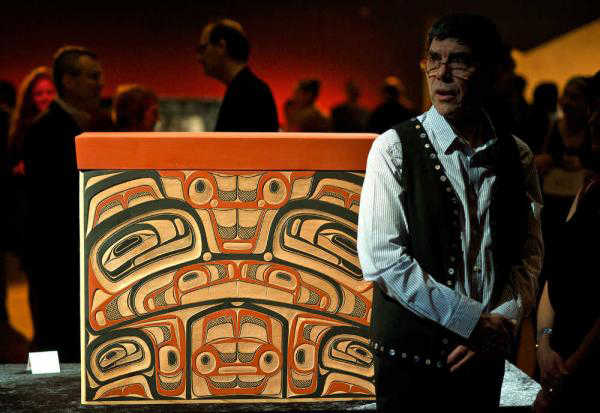At his very first Native art show, David A. Boxley, now a renowned Tsimshian carver and culture bearer, carved Tlingit and Haida totem poles from books. He used model paint instead of acrylics, and suffered from the fumes.
In 2012, he and his son, David R. Boxley, carved a totem pole at the Museum of the American Indian. Through a live video feed on the internet, they waved at schoolkids in Metlakatla on request. More recently they created the Tsimshian house front that greets visitors to Sealaska Heritage Institute’s Walter Soboleff Building.
Boxley was the first speaker in an SHI lecture series in honor of Native American Heritage Month. He spoke Nov. 3 on the revival of Tsimshian culture and his journey as an artist,
His own artistic journey has an arc that is intertwined with that of Metlakatla’s and Northwest indigenous art as a whole. Just a little more than a century ago, Rev. William Duncan, the Anglican minister that led Tsimshian people to settle in Metlakatla, banned potlaching. Dance masks and regalia were confiscated. Tsimshian people were put into prison for traditional and cultural acts like singing, dancing, and giving gifts, Boxley told the audience.
Now, he said, Metlakatla has “seen a revival.”
“So many people are singing and dancing now, and so many people are carving now that weren’t when we first started,” he said. “I think (Tlingit, Haida, and Tsimshian art) stands with the best art in the world.”
Boxley, who carved a totem pole for and hosted the first potlatch in the village, is a big part of that.
The epidemics of smallpox and Spanish flu decimated Alaska Native populations.
Overall, smallpox killed 75 percent of the Pacific Northwest’s indigenous peoples, he said. This affected art, too; many of the people who knew songs, dances, and art died. Mungo Martin, Bill Holm and Bill Reid were some of those that helped keep it alive. Modern-day artists like Nathan Jackson, Norman Tait, Jimmy Hart, Delores Churchill and her daughters have also influenced him, he said.
Formline, Boxley said “is the foundation of everything we do.”
“If the formline isn’t good, the whole thing isn’t good,” he said.
And while he said he doesn’t want to discourage anyone, he also said Alaska Native artists need “to raise the bar for ourselves and for our people.”
“Just because it’s Native-made doesn’t mean it’s good,” he said. “We want to pull everybody up.”
Before European and Russian contact, the four Tsimshian divisions (the Nishga, Gitksan, Southern and Coast Tsimshian) met each summer to harvest eulachon, he said. They pressed oil from the fish, put it in bentwood boxes, and those boxes were traded up and down the coast — a functional way of sharing art.
Many young Alaska Natives are producing beautiful, modern art by studying old pieces such as boxes and screens, he said, mentioning his son, David R. Boxley.
“That house front downstairs really is a direct result of our just studying old pieces,” he said. “Innovation is fine. We’re in favor of innovation. It’s a good thing, but we also have to be careful (to maintain the quality and integrity of the work). … We want to always strive for excellence.”
SHI president Rosita Worl thanked Boxley for his talk.
“I know that future generations are going to be singing your praises,” she said. “I feel so honored to stand in your presence to see what you’ve done. To see what’s possible.”
While his sons, Boxley said, are “my right and left hand, and my heart,” his grandparents are the biggest influence on his life.
“My grandfather is my hero,” he said. “He’s the reason I’m standing here in front of you … Metlakatla di wil waatgu.” (Metlakatla is where I’m from.)
•••
For the rest of SHI’s Native American Heritage Month lectures: On Friday, Nov. 13, Walter Soboleff Day, a panel will speak on retrospective views of Soboleff; Tuesday, Nov. 17, Haida master artist Robert Davidson will speak on his journey with Haida art; Tuesday, Nov. 24, Alutiiq master artist Perry Eaton will speak on “Art of our Ancestors: Kodiak Island,” and Thursday, Dec. 3, young artists Alison Bremner, David R. Boxley, Rico Worl and Nick Galanin will discuss the future of Northwest Coast art.
All lectures begin at noon on the second floor of the Walter Soboleff Building and are free and open to the public.
• Contact Mary Catharine Martin at maryc.martin@capweek.com.

